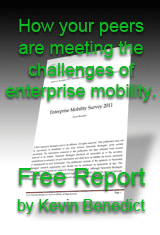The complexity of this custom mobile application, developed as one large mobile app, ensured repeated lengthy debugging efforts, increased costs and length of development time. This was around 2005 and we had a lot to learn.
The project was ultimately done successfully and to everyone's satisfaction, but we experienced pain and learned a great deal. Just about every company of size will have some need for custom mobile applications, however, do each of these applications need to be giant apps with long development times? I think not. The food and beverage mobile app should have been about a dozen different mobile apps. Yes, they could share a menu or UI, but behind the curtains there should have been many separate apps that could be independently developed, tested and updated.
 |
| PSION EP10 PDA |
Today, there are new mobility vendors and strategies that approach these kinds of projects differently. Webalo, for example, enables their customers to configure their own mobile apps in hours online in a SaaS based model in the cloud. I read a press release about one of their recent customer projects today that was interesting and highlighted how much this model is different from the development and deployment models of old. Here is a quote from their customer Nixon Hire, "Our customers’ needs are constantly changing, so we need to be flexible, and flexibility was one of the advantages we saw in Webalo,” said David Balmer, Group IT Manager at Nixon Hire. “We’re able to select the exact data and functionality that each mobile employee needs and give them mobile access in a remarkably short time for an insignificant cost.”
Many business models require constant and rapid changes to mobile apps. I remember meeting with a large utility contractor about their mobility needs. The utility contractor absolutely required mobile apps, and believed they would benefit from them but to my knowledge they never got them. Why? Every contracted job they did had different data requirements. Building custom mobile apps that took months to design, development and deploy would never work for them. They required a mobility vendor that would enable them to rapidly develop, edit, configure and deploy in days. They needed basically a disposable mobile app for each new project. This is not supported by your average mobility vendor business model.
 Companies that require disposable mobile apps, or apps that need to be changed often and rapidly need a business model where they can subscribe to mobile services, rather than particular mobile apps. Also, companies just learning about mobility can benefit from cloud based mobile solutions that can be quickly developed and configured for proof of concepts.
Companies that require disposable mobile apps, or apps that need to be changed often and rapidly need a business model where they can subscribe to mobile services, rather than particular mobile apps. Also, companies just learning about mobility can benefit from cloud based mobile solutions that can be quickly developed and configured for proof of concepts.It is also important to recognize when the content of a mobile app is more important than the mobile app itself. Sometimes you are just looking for a name or number. Sometimes you just want to say "yes" or "no" to a question. It does not require rocket science for these kind of solutions.
Aberdeen Group, in their Mobility in ERP 2011 report, said best in class companies should be looking to deliver "role" based mobile websites (or mobile apps). What does this mean? It means having the ability to quickly develop custom mobile apps/websites for each person or role in your company. In order to accomplish that goal, you need a different business model than most mobility vendors are set-up to provide.
More from Aberdeen Group, "Best-in-Class companies spend 25% of the work week trying to access information, all the others spend almost 40% of their time trying to access information." Sometimes just providing quicker access to information via a mobile app is enough of an ROI.
*************************************************************
Kevin Benedict, Independent Mobile Industry Analyst, Consultant and SAP Mentor Volunteer
Follow me on Twitter @krbenedict
Join the SAP Enterprise Mobility and Sybase Unwired Platform Groups
Read The M2M News Monthly
Full Disclosure: I am an independent mobility analyst, consultant and blogger. I work with and have worked with many of the companies mentioned in my articles.



No comments:
Post a Comment